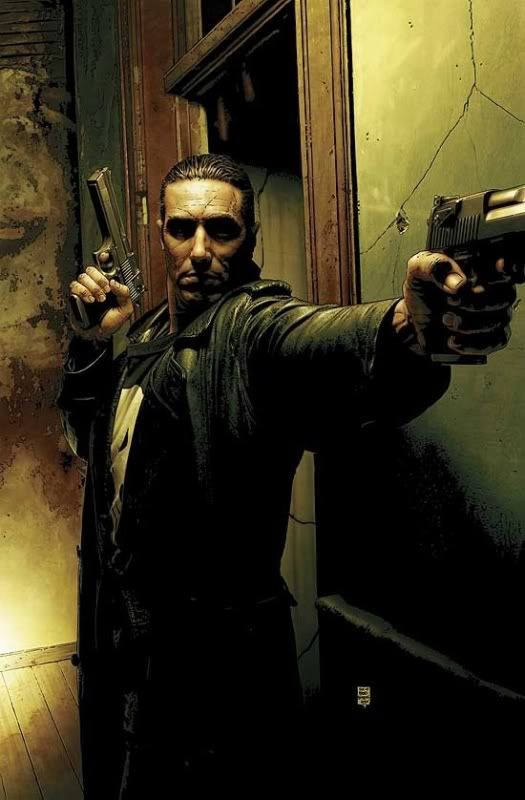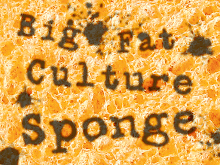
This is the second Garth Ennis series I'm having a look at during the blogs' nocturnal meanderings - which may give you the impression that I'm something of a fan. I'm not really - I'm not too crazy about his most popular work (which would be Preacher, unless things have changed), and there's a lot of little idiosyncrasies about his writing that I find annoying. Which might be the main reason I love his Punisher Max series so much - it's allowed him to play to all his strengths, but lacks the kind of storytelling scope that lets him indulge his more... particular sense of humour (alright. I don't like toilet humour. So sue me) - if he did, he would have ruined the mood he spent 60 issues piecing together. So props to Ennis for showing restraint when it betters the story... though restraint is very much a relative term, of course.
The Punisher, then, is a series of tales of Marvel's urban vigilante. MAX is Marvel's 'adult' imprint, which both allows the writer to cover subject matter which the mainstream marvel stuff barely touches upon in greater depth, and also frees the story from the immense weight of decades of comic continuity. Which isn't to say that Ennis' Punisher lacks for history - far from it. Which is one of the most appealing factors of this series.
See, The Punisher, one Frank Castle, is a Vietnam veteran. This was how the character was conceived when he first showed up in the 70's, and this is a huge part of his background in this series. Don't worry about reading anything else written about the character - the series stands on it's own, and exists in a completely separate universe - but Frank Castle is still a Vietnam veteran - and he's been doing this urban vigilante gig for a long time (about 30 years, all told). The most interesting thing this series asks about this fact is this - one kind of man would actually be able to keep up this kind of daily carnage for almost three decades? What kind of man could come home from what is one the the world's most controversial conflicts and, in fact, keep fighting? The original premise had the character swearing vengeance (or perhaps that should be punishment) on crime after the death of his family, victims of a random shoot-out between gangsters - but after 30 years, that would wear a bit thin on most people's psyche. After all, everyone directly (and some indirectly) responsible for his family's death he personally put in the ground long ago. And his one-man war on crime, though devastating for individual criminals, has never done much about crime in general - he's tough on crime, but doesn't care about the causes of crime.
So, why?
The series offers up a variety of answers, which is where the real meat of the writing lies. Sure, there's some neat little one-liners, fun fire-fights, colourful villains, and the general quality dialogue that Ennis has become rather good at over his career, but for me, at least, the most fun is in the character deconstruction. Not development - Frank doesn't (can't?) change; but even with a static character, you can put him through the emotional wringer, and tease out and torment the little bits of humanity left inside him. Because that's what I found most interesting about this series - it's not exactly saying that there's a little good inside of everyone (or some such rather trite statement), but it demonstrates that even sociopaths have certain human qualities. The series under Ennis never really tries to portray Frank as a hero - he does go out of his way to ensure that innocents are never the victims (targeted or collateral) of his rampages, and he does help out others from time to time, but Frank does not have a spark of what might be considered good within him. Empathy, yes, at times - but he's so far removed from normal human emotions that it takes a real shock to the system to bring him back towards them (and usually when that happens, it's bad news for any criminals in the immediate vicinity - his encounter with a sex-slavery ring being a prime example). He's essentially a machine, acting out a nightly ritual with skills given to him by the American Special Forces, and it's a credit to Ennis that he never really gets boring.
The other interesting part of The Punisher is the world he inhabits, and how this world informs him and the people he encounters. There are few recurring characters in this series - Allies tend not to stick around for long, and not many antagonists survive more than one story arc. Most of the characters are organized criminals (Frank doesn't really care about low-level racketeering and stuff - his main interest is in the organized criminals - the people who've profited most from crime that they build entire industries and empires on it) or members of the intelligence community (who maintain some form of association with Frank on account of his background, and his skills). This allows the story to occasionally step outside the grimy New York settings, and do a little world-hopping - usually to do a favour for a former ally, or to pursue a particularly powerful enemy. But the most interesting stories use his past as a backdrop - in a way, the Vientam war shadows every action Frank takes, 'til the final story all-but-explicitly states it: Frank Castle is in some ways a perfect storm of suvivours' guilt, indomitable will, shell-shock and war-junkie. A machine fueled by pain, that performs acts of barbarity for all-too-human reasons. And though the story never really moves Frank into the arena of pathos (and nor should it), it's not too hard to see Frank as, in some way, a victim of circumstance. Every major step in his life has been fueled by horror, by trauma - and as long as there are those who indulge in horror-for-profit, men like him may be created. And though some of the comparisons between the Vietnam War and America's latest excursions in the Middle-East aren't exactly nuanced - there's a lot of the same kind of tropes that surround these conflicts that The Punisher examines. The world (and specifically, America) did not learn from Vietnam - and the monsters that this latest crop of conflicts will create do not bear much imagining. My own family background made this elements stand out more prominently in mind my - though I can't imagine my Vietnam Vet father really enjoying the series (he's never been much one for fiction, or to the best of my knowledge, comic books), many of the sentiments he's expressed I've heard echoed in the writing of this title. For a series that's essentially one part puerile-revenge-fantasy mixed in with a lot of 80's-style action and some heavy-handed neo-noir overtones, it packs a surprisingly solid emotional punch at times.
So all credit to Garth Ennis for moving me with the story of a sociopath - without relying on gimmicky pathos, and showing restraint towards his more annoying writing tics, he's buried a very human story under a million spent shell casing, several hundred gallons of blood, and enough mobster corpses to fill New York harbour.
As a follow up, there have been a few other Punisher MAX titles following the this one's heels - none of them are quite as good as the original, but it you still hunger for more upon your completion of this series' 60 issue run, Jason Aaron's 22-issues make for a worthy-follow up (and, perhaps, conclusion) to the story of The Punisher - but I still like this original run the best. Cool covers, though.


